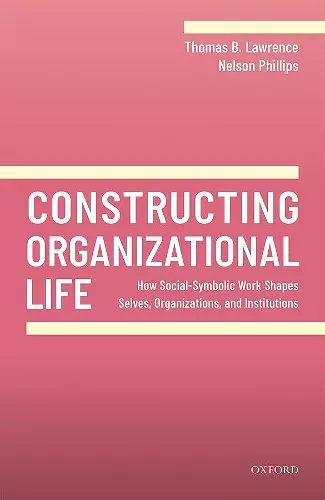Constructing Organizational Life
How Social-Symbolic Work Shapes Selves, Organizations, and Institutions
Thomas B Lawrence author Nelson Phillips author
Format:Hardback
Publisher:Oxford University Press
Published:2nd Jul '19
Should be back in stock very soon

Across the social sciences, scholars are increasingly showing how people 'work' to construct organizational life, including the rules and routines that shape and enable organizational activity, the identities of people who occupy organizations, and the societal norms and assumptions that provide the context for organizational action. The idea of work emphasizes the ways in which people and groups engage in purposeful, reflexive efforts rooted in an awareness of organizational life as constructed in human interaction and changeable through human effort. Studies of these efforts have identified new forms of work including emotion work, identity work, boundary work, strategy work, institutional work, and a host of others. Missing in these conversations, however, is a recognition that these forms of work are all part of a broader phenomenon driven by historical shifts that began with modernity and dramatically accelerated through the twentieth century. This book introduces the social-symbolic work perspective, which addresses this broader phenomenon. The social-symbolic work perspective integrates diverse streams of research to examine how people purposefully and reflexively work to construct organizational life, including the identities, technologies, boundaries, and strategies that constitute their organizations. In this book, the authors define social-symbolic work and introduce three forms - self work, organization work, and institutional work. Social-symbolic work highlights people's efforts to construct the social world, and focuses attention on the motivations, practices, resources, and effects of those efforts. This book explores eight distinct streams of social-symbolic work research, drawing on a broad range of examples from the worlds of business, politics, sports, social movements, and many others. It provides researchers, students, and practitioners with an integrative theoretical framework useful in understanding social-symbolic work, a survey of the main forms of social-symbolic work, a rich set of theoretical opportunities to inspire new studies, and practical methodological guidance for empirical research on social-symbolic work.
Overall, this is a hugely impressive scholarly contribution. The authors cover all the bases: they build up their theory by proposing a clear integrative model, they elaborate and contextualize it in a fine-grained way through extensive reference to the literature and multiple examples. Finally, they enrich it theoretically, provide methodological tools for empirical research and offer practical applications. They do all this in a very accessible writing style, with multiple guideposts at the beginning and ends of chapters, and useful inserts and exhibits that summarize various aspects of the argument as they go along. Make sure your doctoral students read this, and recommend it to your colleagues! * Ann Langley, Organization Studies *
This book is a marvelous treatise...It is a systematic, formal, methodical discussion of principles and evidence of the purposeful, reflexive efforts that make social constructions real. These efforts are built from discursive, relational, and material work that is done in and through social relationships. Evidence of these social-symbolic efforts is gathered from a large amount of management and organization research (the reference section is 36 pages long with roughly 750 citations) If we consider this book as an evocative treatise, then reflexive readers may discover that somewhere in their own thinking, they assume that portions of organizational life consist of social-symbolic work. The logic of this book may help readers articulate that assumption. This reviewer's own experience was one of pleasure at becoming immersed in a well-formed logic imposed on a field the reviewer thought he knew. * Karl E. Weick, Administrative Science Quarterly *
- Winner of Winner of the 2021 George R. Terry Book Award.
ISBN: 9780198840022
Dimensions: 241mm x 159mm x 29mm
Weight: 754g
394 pages